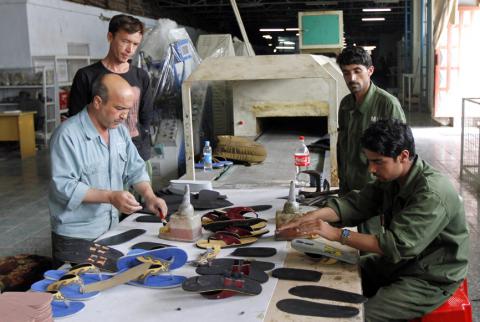Flip-flops with AK-47 bullet primers may seem an unusual fashion choice for US beach-goers, but one US special forces veteran hopes the factory he has set up in Kabul to make the footwear will help bring a better life to people in Afghanistan.
Former Special Forces serviceman Matthew Griffins says that the unlikely decision to launch the range of beach shoes was a “light bulb” moment inspired in 2010 by watching a factory worker punch holes into a leather strap used to make army boots.
Griffin was back in Afghanistan, on one of many trips to the nation he fell in love with while fighting there from 2003 to 2006, seeking for a way to help a people he remembered as unusually generous.

Photo: Reuters
“I just remember how giving the people in Afghanistan were. We’d go up in the mountains and we’d stay in a village and they literally feed us until they were out of food,” Griffin said.
“It was the first part of December and they had the rest of winter to live on the food that they had essentially fed us,” he said.
With a view to promoting local employment, he and another US veteran, with backing from a Seattle-based business partner, set up a factory in Kabul to make flip-flops.
Their line of “Combat Flip Flops,” which sell from US$65 to US$75, gives buyers the choice of a range of designs that will remind their owners of lands far from sunny US beaches and towns.
“Rather than another product to sell that looks good or feels good or is the new fashion, there’s a product with a story to be told and people want to be part of that story,” Combat Flip Flops president Andrew Sewrey said.
The designs include AK-47 rifle bullet casings, Navy SEAL logos and even Afghan poppies, a plant grown widely in Afghanistan and used to make illegal drugs like heroin.
“[The AK-47] is the weapon of choice for the military and what not, so we put a AK-47 bullet primer around the strap,” Sewrey said, standing beside an Afghan worker making prototypes of the footwear.
So far, their main customers are military families, but they hope the business will appeal to a wider audience and provide long-term employment for Afghans who have come to depend on opportunities linked to the more than decade-long war.
“We got into this and promised Afghans a better life,” Griffin said. “We’ve invested billions of tax dollars and lost some of the best American leaders we have to offer and it’d be a shame if it were [all for] nothing.”

WEAKER ACTIVITY: The sharpest deterioration was seen in the electronics and optical components sector, with the production index falling 13.2 points to 44.5 Taiwan’s manufacturing sector last month contracted for a second consecutive month, with the purchasing managers’ index (PMI) slipping to 48, reflecting ongoing caution over trade uncertainties, the Chung-Hua Institution for Economic Research (CIER, 中華經濟研究院) said yesterday. The decline reflects growing caution among companies amid uncertainty surrounding US tariffs, semiconductor duties and automotive import levies, and it is also likely linked to fading front-loading activity, CIER president Lien Hsien-ming (連賢明) said. “Some clients have started shifting orders to Southeast Asian countries where tariff regimes are already clear,” Lien told a news conference. Firms across the supply chain are also lowering stock levels to mitigate

Six Taiwanese companies, including contract chipmaker Taiwan Semiconductor Manufacturing Co (TSMC, 台積電), made the 2025 Fortune Global 500 list of the world’s largest firms by revenue. In a report published by New York-based Fortune magazine on Tuesday, Hon Hai Precision Industry Co (鴻海精密), also known as Foxconn Technology Group (富士康科技集團), ranked highest among Taiwanese firms, placing 28th with revenue of US$213.69 billion. Up 60 spots from last year, TSMC rose to No. 126 with US$90.16 billion in revenue, followed by Quanta Computer Inc (廣達) at 348th, Pegatron Corp (和碩) at 461st, CPC Corp, Taiwan (台灣中油) at 494th and Wistron Corp (緯創) at

NEGOTIATIONS: Semiconductors play an outsized role in Taiwan’s industrial and economic development and are a major driver of the Taiwan-US trade imbalance With US President Donald Trump threatening to impose tariffs on semiconductors, Taiwan is expected to face a significant challenge, as information and communications technology (ICT) products account for more than 70 percent of its exports to the US, Chung-Hua Institution for Economic Research (CIER, 中華經濟研究院) president Lien Hsien-ming (連賢明) said on Friday. Compared with other countries, semiconductors play a disproportionately large role in Taiwan’s industrial and economic development, Lien said. As the sixth-largest contributor to the US trade deficit, Taiwan recorded a US$73.9 billion trade surplus with the US last year — up from US$47.8 billion in 2023 — driven by strong

ASE Technology Holding Co (ASE, 日月光投控), the world’s biggest chip assembly and testing service provider, yesterday said it would boost equipment capital expenditure by up to 16 percent for this year to cope with strong customer demand for artificial intelligence (AI) applications. Aside from AI, a growing demand for semiconductors used in the automotive and industrial sectors is to drive ASE’s capacity next year, the Kaohsiung-based company said. “We do see the disparity between AI and other general sectors, and that pretty much aligns the scenario in the first half of this year,” ASE chief operating officer Tien Wu (吳田玉) told an